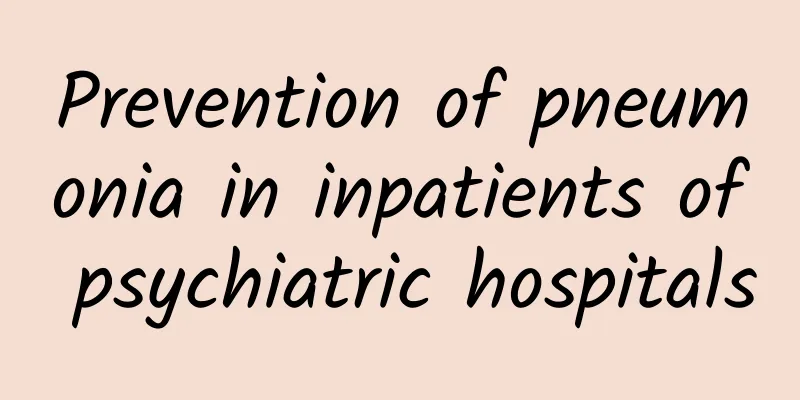Prevention of pneumonia in inpatients of psychiatric hospitals

|
Speaking of pneumonia, I believe many people are familiar with it. In recent years, with the continuous development of social economy, the atmospheric environment has been greatly affected. Therefore, the incidence of pneumonia in clinical practice has shown a gradual upward trend in recent years, becoming a common respiratory disease in clinical practice, and pneumonia has a great impact on people’s quality of life when it occurs. But it is worth noting that there is such a group in our lives-patients with mental disorders, especially inpatients in psychiatric hospitals. Because their thinking state is different from that of ordinary people, in order to improve patients’ treatment compliance and patients’ quality of life, it is very important to take active pneumonia prevention measures for these inpatients. In order to deepen everyone’s understanding of pneumonia prevention for inpatients in psychiatric hospitals, let us start from the perspective of inpatients in psychiatric hospitals today and talk about what knowledge is there about pneumonia prevention? The picture comes from the Internet 1. What is pneumonia? Generally speaking, pneumonia refers to infectious inflammation of the alveoli, distal airways and interstitial lungs, which is mainly caused by bacteria, viruses or other pathogens. Currently, bacterial and viral pneumonia are the main types of pneumonia in clinical practice. 2. Symptoms of pneumonia (1) Chills and high fever For patients with pneumonia, the typical symptoms are sudden chills and high fever. When the disease breaks out, the patient's body temperature can be as high as 39-40℃, showing a retained fever type. At the same time, the patient will also have symptoms such as headache, muscle soreness, and lack of appetite. When patients take antibiotics, the fever is not typical, and for the elderly and weak patients, these patients will only have a low fever or no fever. (2) Cough and sputum In the early stage of pneumonia, the patient will have an irritating dry cough, and then as the disease progresses, the patient will cough up white mucus or bloody sputum. After one or two days, the patient may cough up mucus, bloody sputum, rusty sputum, purulent sputum, etc. During the pneumonia dissipation period, the patient's sputum volume increases, and the sputum is yellow and thin. (3) Chest pain Pneumonia patients usually experience severe chest pain, like a needle prick, during the onset of the disease. The pain is aggravated by coughing or deep breathing, and can spread to the shoulders and abdomen. If the patient's pneumonia is lower lobe pneumonia, it can irritate the patient's diaphragm and cause abdominal pain, so it is often misdiagnosed as acute abdomen. (4) Difficulty breathing Pulmonary consolidation can cause patients to experience insufficient ventilation, poor gas exchange, decreased arterial oxygen saturation, etc., which in turn can lead to symptoms of cyanosis, chest pain, and difficulty breathing. (5) Other symptoms In addition to the above symptoms, pneumonia can also cause patients to experience symptoms such as nausea, vomiting, abdominal distension or diarrhea, and even severe cases may cause symptoms such as confusion, irritability, drowsiness, and coma. The picture comes from the Internet 3. The harm of pneumonia to patients in psychiatric hospitals (1) Anxiety They are afraid that their illness will not be effectively treated, that their original illness cannot be cured, and that they may be infected with pneumonia if they come into contact with others while in the hospital. Therefore, these patients will become restless during hospitalization and may even have symptoms such as panic, heart palpitations, and sweating. (2) Fear Due to the fear of pneumonia, inpatients in psychiatric hospitals are afraid to have blood drawn, injections, contact with other patients, incomplete disinfection, and death during their hospitalization, and they are in a state of panic all day long. (3) Loneliness and depression Due to the need to prevent pneumonia, hospitals may impose isolation management on individual patients. Without family care and visits, patients may feel lonely and lost, and may even become depressed and cry frequently. (4) Anger Many patients believe that they are not infected with pneumonia, so why are they not allowed to have visitors or family members accompany them? They verbally attack their family members and medical staff, and even physically attack them. (5) Pessimism They lose confidence in treatment and life, thinking they are hopeless and that even if they recover, they will still not be able to lead a normal life after being discharged from the hospital. (6) Dependency Enhancement They behave in a childish manner, may cry, demand attention, cannot tolerate being ignored, and easily feel abandoned. (7) Worsening paranoia Pay close attention to the words and actions of medical staff, worrying about being concealed. 4. Prevention of pneumonia in patients hospitalized in psychiatric hospitals (1) When nursing staff patrol at night, they should pay attention to covering patients with blankets and taking appropriate insulation measures to prevent them from catching cold. This can reduce the risk of pneumonia infection for patients with low immunity such as those who are hospitalized for a long time or the elderly. At the same time, the education and training of hand hygiene and cough etiquette for general practitioners should be strengthened in normal times, and patients should be taught the seven-step hand washing method and guided to wash their hands frequently before and after meals and after going to the toilet. (2) Strengthen the disinfection of the ward environment: Carry out disinfection work every day, strictly follow the disinfection concentration ratio, and thoroughly disinfect the air, surface of objects and the ground in the room. The picture comes from the Internet (3) Temperature monitoring: Due to the special circumstances of patients with mental illness, some patients are unable to accurately express their discomfort, which can easily delay the treatment of the disease. Therefore, nursing staff must be proactive in their work, measure, observe, and ask questions frequently. Before pneumonia spreads and becomes epidemic, they must be proactive and measure the body temperature of all general practitioners every day. The picture comes from the Internet (4) Appropriate isolation: For psychiatric hospitals, during the prevention and care of pneumonia for inpatients, if any patient has flu symptoms such as cough, sore throat, runny nose, fatigue and aches, they should be given centralized care and reported to the doctor in a timely manner for appropriate treatment and isolation. During the isolation treatment, the corresponding ward can be arranged according to the severity of the patient's condition, and the patient should be urged to wear a mask in a standardized manner. At the same time, the patient's explanation should be done well to reduce the patient's outdoor activities to avoid the large-scale spread of pneumonia. (5) Provide psychological counseling: If a large number of patients with fever appear in the ward of a psychiatric hospital, it will cause panic and speculation among other patients, leading to psychological fluctuations in the patients. Therefore, nursing staff must provide appropriate psychological care to the patients to stabilize their emotions and enable them to actively cooperate with treatment, so as to control the spread and prevalence of the disease as soon as possible. (6) Regular ventilation: Ventilation should be done every day. Reasonable ventilation is one of the important means to reduce the prevalence of pneumonia. We should try to avoid ventilation when there are people in the ward. After ventilation, the temperature in the ward must be returned to normal before allowing the patient to return to the ward to rest to avoid catching a cold. (7) Strengthening health management: Psychiatric hospitals need to pay attention to the health management of patients when preventing pneumonia in inpatients during the autumn and winter seasons. Since clothing is less breathable during the autumn and winter seasons, many patients have poor hygiene. Long-term use of psychiatric drugs can cause excessive oil secretion in the skin, which can easily lead to infectious diseases. (8) Nutritional supplements: Patients rarely eat fresh vegetables and fruits in autumn and winter, and vitamins and other nutrients are not supplemented. In addition, they have poor appetite after taking psychiatric drugs, which leads to decreased immunity. Therefore, nursing staff need to observe the patient's eating conditions and provide different degrees of nutritional supplements to patients with poor diet and poor physical fitness to enhance the patient's immunity and prevent pneumonia. (9) Strengthen physical exercise: Organize patients to participate in labor and recreational activities in the rehabilitation department to enhance their physical fitness and reduce the incidence of pneumonia. The picture comes from the Internet Summary: Pneumonia is a common respiratory inflammation in clinical practice and has a great impact on inpatients in psychiatric hospitals, so active preventive measures need to be taken to reduce the risk of pneumonia. |
<<: Exercise to relieve stress before the end of the semester, here’s how to do it!
>>: Can eating rice cause allergies? Do you know these strange allergens?
Recommend
What causes hair loss during breastfeeding?
Some women may experience hair loss during breast...
A collection of frequently asked questions about refractive error in children
This is the 3163th article of Da Yi Xiao Hu I com...
What should I do if I always have back pain after having an IUD inserted?
There are many reasons why women do not want to g...
What diseases can low immunity cause? What foods can you eat to enhance immunity?
Immunity is the ability of our body to resist bac...
Can I drink red dates and wolfberry tea during my period?
During menstruation, a girl's body is at its ...
10 Secrets to Eliminating Vaginal Itching
Treatment of vaginal itching 1. Women’s genitals ...
Cervical cancer stages
Cancer is a common disease nowadays. Any cancer s...
What kind of gift is good for an uncle to give to a newborn baby?
What should uncles and aunts give to newborn babi...
Causes of dark red discharge
Many friends who have just finished their vacatio...
Causes and treatment of abnormal leucorrhea
Women also need to protect their own health, espe...
How to regulate your menstrual cycle
When a woman's body develops to a certain ext...
Is it better for the uterus to be forward or backward?
When women are pregnant, they often have a questi...
Pregnancy NT test cost
The NT test is: NT (nuchal translucency), that is...
What causes obesity due to low menstrual flow?
There is no direct relationship between less mens...
10 weeks of pregnancy
Every female friend has the possibility of gettin...









